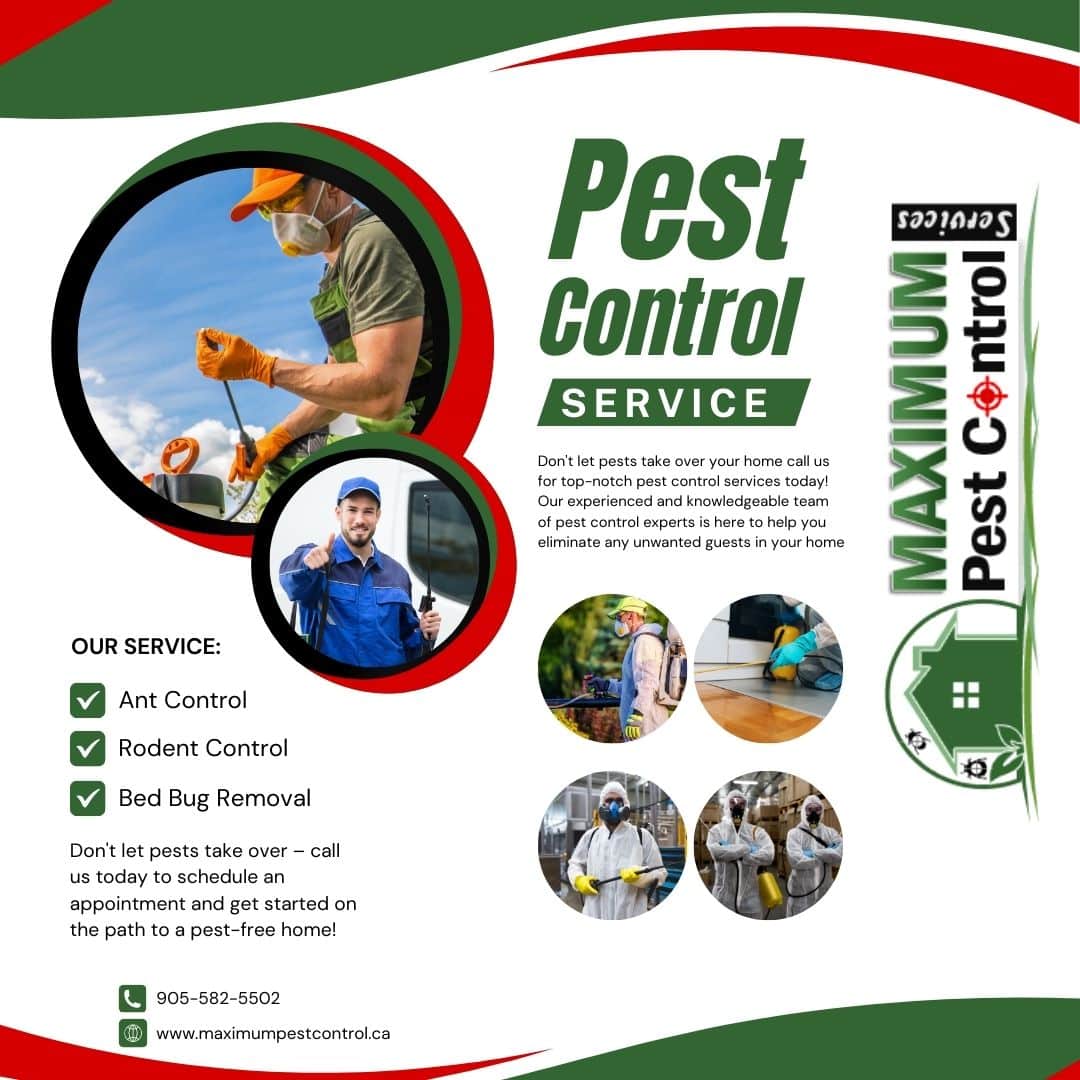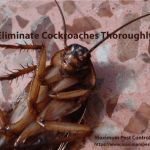
8 Smart Tricks to Keep Spiders Out of Your Storage Unit
Protect Your Home and Business from Spiders: Hire Maximum Pest Control Services Today Calling (905) 582-5502.
It can be pretty daunting to keep spiders off your storage unit. Any space can be penetrated by a spider just for shelter. They slip through tiny gaps and build webs in dark corners. A storage unit happens to be an ideal place to reside in. People rarely check what’s inside their stored pieces, and that’s where the spiders come alive. Their cobwebs could stick to your furniture, boxes, and other fragile items. Following are eight easy tricks to let you keep spiders outside of your unit.
1. Deep Cleaning and Inspection
Dirt and dust invite insects that spiders love to devour. Therefore, deep cleaning is the very first and foremost move before storing anything. Remove the cobwebs, and vacuum every corner. Check the walls, floor, and shelving units. Wipe surfaces with a mild detergent.
Pay special attention to the bottom of boxes. Cleaning reduces insect populations, and fewer insects mean fewer spiders coming in. Do not forget those difficult-to-reach areas, including edges of ceilings. Regular cleaning sessions keep spiders away from feeling at home.
Eliminate all clutter that can provide the spider with a hiding place. Make all cleaning utensils accessible so that frequent cleanups are made. Cleanliness is the backbone of no spiders. Persistence will leave the spiders with zero chances.
2. Spiders Out By Sealing Gaps and Cracks
They pass through very tiny openings. Small cracks are the means by which they make use of the walls in the unit. These must be sealed with caulk or foam sealant. The frames of doors and windows serve in the same capacity and are to be checked. Weather-stripping around the doors will act as a barrier to entry.
Check corners, especially where the walls meet the floor. Seal any holes around utility lines. A well-sealed unit will prevent spiders from sneaking inside. Time invested in performing this maintenance will save you from infestations that may arise later. Proper sealing keeps moisture and insects out, too.
Watch for baseboards and corners where walls meet. If after some time you see sealants begin to wear off, reapply them. By being vigilant, no new gaps will be formed. A well-sealed unit is any spider’s worst nightmare.
3. Choose Plastic Bins Instead of Cardboard
Box cardboard is a real nice home for spiders. It is dark inside and access is pretty easy. Plastic bins are more of a secure barrier. Smooth sides will discourage any webbing activity in the corners while they seal tighter, thus keeping the moisture out.
This is because bugs love moisture, and spiders are very much attracted to bug activity. Label your bins, so you will not be scratching your head later. The see-through sides allow one to see what is inside of them. Stack these bins neatly on sturdy shelves for an organized setup that repels spiders out.
Cardboard also absorbs moisture, inviting pests. Plastic bins protect your valuables against humidity. Find durable bins that are able to stack easily to save space. Quality containers reward you with peace of mind.
4. Make Use of Natural Repellents Against Spiders
You really do not have to use harsh chemicals in keeping them away. There are some natural ingredients that work wonders as repellents. Peppermint oil is among the most popular ones. In spray bottle mix couple of drops with not much water to stay concentrated. Spray along walls and around door frames.
They abhor that smell. Some other effective ones are tea tree and citrus-based essential oils too. Keeping the corners and fabrics around with blocks or chips of cedar does a great job in keeping away bugs of various species including spiders. Natural repellents smell fresh yet accomplish their work with no toxic fumes.
Cloves and eucalyptus also repel spiders out. You might consider fragrances you enjoy. These natural repellents will need to be replaced to be effective, but they keep your storage unit fragrant, too.
5. Keep the Area Dry
Spiders and all insects just love moisture. Excess water invites insects and mold. In an enclosed unit each problem multiplies with incredible speed. If your facility allows them, use a dehumidifier in your unit. When at all possible, open vents or small windows for some air circulation.
Damp air gives rise to damp corners and condensation. Spiders find ideal, damp areas to hide in. Clean up spills and leaks immediately. Be aware of any water seepage either from the pipes or through the walls. A dry environment keeps pests away.
Check humidity with a small gauge. If high, it’s time for a dehumidifier or ventilation fix. After heavy rain, check your items for dampness. This will help keep your space moist-free and, by default, spider-free.
6. Store Items Strategically
Spiders love hiding in clutter. A stack of boxes creates dark areas for webs. Organize your unit to minimize dark areas. Allow space between stacks for easy inspection.
Raise boxes onto pallets or shelves. This keeps them from sitting directly on the floor. Use clear labels on them so that you can locate things in an instant. Digging through boxes stirs dust and could unleash spiders. Make a simple map of what is stored. You will save time and avoid spider surprises.
Avoid stacking upwards, unstably. Spiders love those air pockets hidden in unstable stacks. Give yourself an easy path to walk through. You place them at strategic points in order for you to have a view of every nook and corner with one glance.
7. Regular Maintenance Visits
Regular visits prevent minor problems in spider numbers developing into major ones. Give yourself at least a month’s time and pay a visit to your unit. Look for webs, egg sacs, or crawling intruders. Evict any sign of spider action.
Vacuum corners and sweep floors each visit. Open boxes to inspect for spider nesting in them. Remove dead insects to remove the food source of spiders. A little now can save a great deal later. Note any cracks and/or leaks you see over time. Update these before the problem gets big.
Check for changes in temperature and humidity in the unit. You can be sure it’s time to change the approach when some of the webs begin to appear once more. Take them off immediately before they propagate all over again. It wouldn’t take too long; with frequent maintenance, spiders will not overrun your home.
8. No Hitchhikers
Sometimes we bring spiders along when we carry in our belongings. They tuck themselves in the folds of blankets or inside furniture. Examine items before bringing them into your home for storage. Shake out clothes and linens to dislodge pest hiding in them. Wipe down secondhand furniture, or vacuum upholstered pieces.
Check cushions, legs, and crevices carefully. Clean gardening tools before storing them. Outdoor spiders often cling to rakes, shovels, or pots. Seal outdoor equipment in plastic bags or bins. Block the opportunity of any spider passengers from taking residence.
Brush off loose leaves or debris clinging to items brought inside from outdoors. Even a smudge of dirt may harbour spider eggs. If possible, keep a separate bin for outdoor gear. A little prudence now obviates a big spider problem later. It is not that difficult to keep spiders out of your storage unit. A little proactive approach does much to help. Looking for expert spider pest control? Say goodbye to house pests. Call (905) 582-5502 today for fast, reliable, and effective pest control solutions for both residential and commercial accounts.




